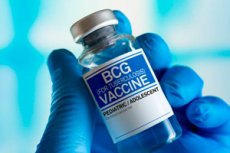Nye publikasjoner
BCG-vaksine beskytter personer med type 1-diabetes mot et alvorlig forløp av covid-19
Last reviewed: 02.07.2025

Alt iLive-innhold blir gjennomgått med medisin eller faktisk kontrollert for å sikre så mye faktuell nøyaktighet som mulig.
Vi har strenge retningslinjer for innkjøp og kun kobling til anerkjente medieområder, akademiske forskningsinstitusjoner og, når det er mulig, medisinsk peer-evaluerte studier. Merk at tallene i parenteser ([1], [2], etc.) er klikkbare koblinger til disse studiene.
Hvis du føler at noe av innholdet vårt er unøyaktig, utdatert eller ellers tvilsomt, velg det og trykk Ctrl + Enter.

En ny studie ledet av forskere ved Massachusetts General Hospital (MGH) viser at den hundre år gamle Bacille Calmette-Guerin (BCG)-vaksinen, opprinnelig utviklet for å forhindre tuberkulose, beskytter personer med type 1-diabetes mot alvorlig sykdom forårsaket av COVID-19 og andre smittsomme sykdommer.
To randomiserte, dobbeltblinde, placebokontrollerte studier fant at BCG-vaksinen ga kontinuerlig beskyttelse gjennom mesteparten av COVID-19-pandemien i USA, uavhengig av virusvariant.
«Personer med type 1-diabetes er svært utsatt for smittsomme sykdommer og har dårligere utfall når de blir smittet med SARS-CoV-2-viruset», sa seniorforfatter av studien Dr. Denise Faustman, direktør for Laboratory of Immunobiology ved MGH og førsteamanuensis i medisin ved Harvard Medical School.
«Publiserte data fra andre forskere viser at mRNA COVID-19-vaksiner ikke er særlig effektive hos denne sårbare pasientgruppen. Men vi har vist at BCG kan beskytte type 1-diabetikere mot COVID-19 og andre smittsomme sykdommer.»
Den 18 måneder lange fase III-studien som ble publisert i iScience ble utført sent i pandemien i USA, da den svært smittsomme omikronvarianten sirkulerte. Den 15 måneder lange fase II-studien ble utført tidlig i pandemien, og resultatene av denne studien ble publisert i Cell Reports Medicine.
Under COVID-19-pandemien har flere internasjonale studier testet om BCG, som enkeltdose eller booster gitt til tidligere vaksinerte voksne, kan beskytte dem mot infeksjon og COVID-19. Disse studiene har bidratt til en stor global database med kliniske studier som viser at BCG gitt til nyfødte fungerer som en plattform for alle smittsomme sykdommer, muligens i flere tiår. Men resultatene av disse studiene av BCG-boostere hos tidligere vaksinerte personer har vært blandede: fem randomiserte studier viste effekt og syv gjorde det ikke.
De kliniske fase II- og III-studiene av MGH som testet BCG skilte seg fra andre BCG-studier på viktige måter. I stedet for å motta én dose BCG, fikk deltakerne fem eller seks doser av en spesielt potent stamme av BCG-vaksinen. Amerikanske deltakere ble fulgt i 36 måneder i stedet for uker eller måneder.
«Vi vet at hos personer som ikke tidligere har fått BCG-vaksinen, kan det ta minst to år før man oppnår full beskyttelse ved bivirkninger utenfor målområdet», sa Faustman. «Gjentatt administrering av vaksinen kan fremskynde denne prosessen.»
Og viktigst av alt, den amerikanske befolkningen hadde aldri fått BCG-vaksinen, så disse kliniske studiene var ikke boosterstudier.
«Fase II- og III-studiene som ble utført ved MGH var unike fordi de var de eneste COVID-19-studiene i verden der befolkningen ikke hadde fått BCG-vaksinen eller blitt eksponert for tuberkulose», sa Faustman. «Studier utført i land der deltakerne tidligere hadde fått BCG-vaksinen som nyfødte eller hadde blitt eksponert for tuberkulose, kunne ha skjult enhver fordel av BCG-boosteren.»
MGH-studiene involverte 141 personer med type 1-diabetes; 93 personer i behandlingsgruppen fikk fem eller seks doser av BCG-vaksinen, og 48 personer i placebogruppen fikk en dummy-vaksine og ble fulgt i 36 måneder for å spore ulike genetiske varianter av COVID-19 og mange infeksjonssykdommer.
Under en tidlig fase II-studie (januar 2020 til april 2021), da viruset var mer dødelig, men mindre smittsomt, var BCG-vaksinen 92 % effektiv, sammenlignbar med Pfizer- og Moderna COVID-19-vaksinene hos friske voksne.
I løpet av hele de 34 månedene av COVID-19-pandemien i USA hadde BCG-vaksinen en betydelig effekt på 54,3 %. Forskerne fant også at deltakerne som fikk BCG-behandling hadde lavere forekomst av virus-, bakterie- og soppinfeksjoner, samt selve COVID-19-sykdommen.
BCG-vaksinen gir immunitet som sannsynligvis varer i flere tiår, en klar fordel i forhold til COVID-19-vaksinen og vaksiner mot andre smittsomme sykdommer som influensa, hvor effektivitetsvarigheten bare er to eller tre måneder.
«BCG-vaksinen gir mulighet for nesten livslang beskyttelse mot alle varianter av COVID-19, influensa, respiratorisk syncytialvirus og andre smittsomme sykdommer», sa Faustman.
Noen av deltakerne som fikk BCG-behandling fikk også kommersielt tilgjengelige COVID-19-vaksiner under fase III-studien. Forskerne bemerket at Pfizer-, Moderna- og Johnson & Johnson-vaksinene ikke beskyttet personer med type 1-diabetes mot COVID-19.
«Studien vår viste at BCG-vaksinen ikke økte effektiviteten til COVID-19-vaksinen, og at den ikke var skadelig for de som fikk COVID-19-vaksinen», sa Faustman. «Etter hvert som pandemien fortsetter å utvikle seg, vil det være interessant å se om vi kan samarbeide med FDA for å gi tilgang til BCG-vaksinen for type 1-diabetikere, som ser ut til å være spesielt utsatt for alle smittsomme sykdommer.»
